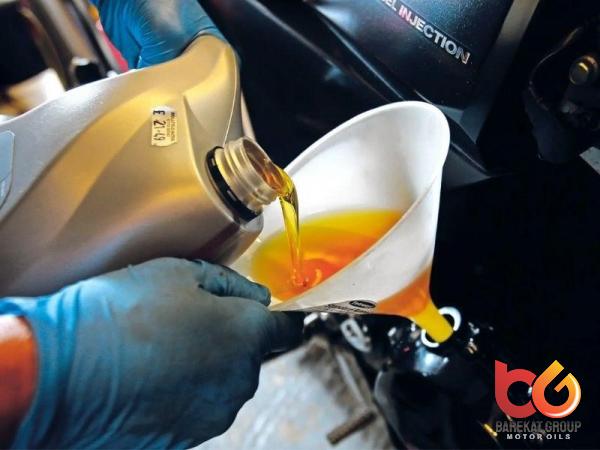A Comprehensive Guide to Engine Oil Types Introduction: Engine oil plays a crucial role in ensuring the smooth functioning and longevity of an automobile engine. With various options available in the market, understanding the different types of engine oil is essential for making informed decisions regarding your vehicle. In this comprehensive guide, we will discuss the various engine oil types, their characteristics, and factors to consider when selecting the right one for your vehicle. PART 1: Conventional Engine Oil – Conventional engine oil, also known as mineral oil, is derived from petroleum crude oil through refining and purification processes. – It is the most basic type of engine oil and is widely available and affordable. – Although it offers adequate lubrication, conventional oil requires more frequent oil changes compared to synthetic oils due to its shorter lifespan. – It is suitable for older vehicles or those operating under moderate driving conditions. PART 2: Synthetic Engine Oil – Synthetic engine oil is artificially synthesized, designed to offer superior performance and better protection for modern engines. – It is made using chemically modified compounds, resulting in a purer and more consistent oil composition. – Synthetic oil offers enhanced lubrication, superior resistance to extreme temperatures, and better engine cleanliness. – Due to its advanced formulation, synthetic oil provides longer-lasting protection, thereby reducing the frequency of oil changes. – Synthetic oil is recommended for high-performance vehicles, engines under extreme conditions, and for people who intend to maximize engine lifespan. PART 3: High Mileage Engine Oil – High mileage engine oil is designed specifically for vehicles with a higher mileage or older engines. – It contains additives that help reduce oil consumption, prevent leaks, and reduce engine wear common among older vehicles. – The formulation of high mileage engine oil typically includes seal conditioners to rejuvenate aging gaskets and seals.
Engine oil
 – This type of oil helps to minimize engine leaks and oil burn-off, providing better protection for older engines. PART 4: Synthetic Blend Engine Oil – Synthetic blend oil is a combination of conventional oil and synthetic oil. – This type of oil provides some benefits associated with synthetic oil, such as better temperature resistance and improved engine protection. – Synthetic blend oil is often used in vehicles that demand higher performance and protection levels but may not require the full benefits of synthetic oil. – It offers a balance between cost-effectiveness and enhanced engine performance, making it a popular choice for many consumers. PART 5: Specialty Engine Oil – Specialty engine oils are designed for specific applications or unique conditions that require specialized lubrication. – Examples include oils for high-performance racing engines, motorcycles, diesel engines, and vehicles operating in extreme temperatures. – Specialty engine oils have distinct formulations and additives tailored to meet the specific requirements of these specialized applications. PART 6: Considerations When Choosing Engine Oil – Vehicle manufacturer recommendations: Always refer to your vehicle’s owner manual for the recommended engine oil type and viscosity. – Driving conditions: Consider the type of driving conditions you typically encounter, such as extreme temperatures, heavy loads, or frequent stop-and-go traffic, as these factors affect engine oil performance. – Age and mileage of the vehicle: Older vehicles or those with higher mileage may benefit from high mileage engine oil. – Personal preferences and budget: Evaluate your priorities, such as extended oil change intervals, improved engine performance, or cost savings, to choose the right oil type for your needs. Conclusion: Choosing the right engine oil is crucial for maintaining the performance and longevity of your vehicle’s engine. By understanding the different types of engine oil available, including conventional, synthetic, high mileage, synthetic blend, and specialty varieties, you can make an informed decision based on your vehicle’s needs and your personal preferences. Regular oil changes using the appropriate type and grade of oil will ensure optimal engine performance and minimize the risk of engine damage.I. The Importance of Engine Oil in Business Operations In the world of business, engine oil is not only essential for personal vehicles but also for commercial vehicles and machinery. The efficient operation of these assets directly impacts productivity, cost efficiency, and overall profitability.
– This type of oil helps to minimize engine leaks and oil burn-off, providing better protection for older engines. PART 4: Synthetic Blend Engine Oil – Synthetic blend oil is a combination of conventional oil and synthetic oil. – This type of oil provides some benefits associated with synthetic oil, such as better temperature resistance and improved engine protection. – Synthetic blend oil is often used in vehicles that demand higher performance and protection levels but may not require the full benefits of synthetic oil. – It offers a balance between cost-effectiveness and enhanced engine performance, making it a popular choice for many consumers. PART 5: Specialty Engine Oil – Specialty engine oils are designed for specific applications or unique conditions that require specialized lubrication. – Examples include oils for high-performance racing engines, motorcycles, diesel engines, and vehicles operating in extreme temperatures. – Specialty engine oils have distinct formulations and additives tailored to meet the specific requirements of these specialized applications. PART 6: Considerations When Choosing Engine Oil – Vehicle manufacturer recommendations: Always refer to your vehicle’s owner manual for the recommended engine oil type and viscosity. – Driving conditions: Consider the type of driving conditions you typically encounter, such as extreme temperatures, heavy loads, or frequent stop-and-go traffic, as these factors affect engine oil performance. – Age and mileage of the vehicle: Older vehicles or those with higher mileage may benefit from high mileage engine oil. – Personal preferences and budget: Evaluate your priorities, such as extended oil change intervals, improved engine performance, or cost savings, to choose the right oil type for your needs. Conclusion: Choosing the right engine oil is crucial for maintaining the performance and longevity of your vehicle’s engine. By understanding the different types of engine oil available, including conventional, synthetic, high mileage, synthetic blend, and specialty varieties, you can make an informed decision based on your vehicle’s needs and your personal preferences. Regular oil changes using the appropriate type and grade of oil will ensure optimal engine performance and minimize the risk of engine damage.I. The Importance of Engine Oil in Business Operations In the world of business, engine oil is not only essential for personal vehicles but also for commercial vehicles and machinery. The efficient operation of these assets directly impacts productivity, cost efficiency, and overall profitability.
Specifications of Engine oil
 Understanding the various types of engine oil available and selecting the most suitable one for your business vehicles and equipment can result in significant benefits. II. Optimal Performance with Synthetic Engine Oil Synthetic engine oil is particularly advantageous for businesses that rely on high-performance vehicles and machinery. These include delivery trucks, construction equipment, and agricultural machinery. The advanced formulation of synthetic oils offers superior lubrication, reducing friction, and wear. This, in turn, results in improved fuel efficiency, reduced maintenance costs, and extended engine life. By using synthetic engine oil, businesses can ensure maximum performance and reliability for their fleet. III. Enhancing Efficiency with High Mileage Engine Oil For businesses with older vehicles or machinery, high mileage engine oil can be a game-changer. As assets age, they may experience increased oil consumption, leaks, and engine wear. High mileage oil contains additives that address these issues by rejuvenating seals and gaskets, minimizing leaks, and reducing oil burn-off. By using high mileage oil, businesses can prolong the life of their aging assets, reduce downtime, and minimize the need for costly repairs or replacements. IV. Cost-Effectiveness of Synthetic Blend Engine Oil Many businesses operate on a tight budget and look for cost-effective solutions without compromising performance. Synthetic blend engine oil offers a suitable alternative in such cases. Blending conventional and synthetic oils, this type of oil provides enhanced lubrication, better temperature resistance, and improved engine protection. While synthetic blend oil may not offer the same level of performance as full synthetic oil, it strikes a balance between cost-effectiveness and performance, making it an attractive choice for many businesses. V. Specialty Engine Oils for Specific Applications Certain industries require specialized lubrication to meet the unique demands of their operations. For example, businesses in the racing industry require engine oils that can withstand extreme temperatures and high RPMs. Similarly, manufacturers and operators of diesel engines need oils specifically formulated for the unique characteristics and demands of diesel combustion. By utilizing specialty engine oils, businesses can optimize the performance, efficiency, and durability of their vehicles and machinery in specific applications. VI. The Role of Engine Oil in Business Sustainability In recent years, businesses across various industries have been placing greater importance on sustainability and reducing their environmental impact. Engine oil plays a crucial role in achieving these sustainability goals.
Understanding the various types of engine oil available and selecting the most suitable one for your business vehicles and equipment can result in significant benefits. II. Optimal Performance with Synthetic Engine Oil Synthetic engine oil is particularly advantageous for businesses that rely on high-performance vehicles and machinery. These include delivery trucks, construction equipment, and agricultural machinery. The advanced formulation of synthetic oils offers superior lubrication, reducing friction, and wear. This, in turn, results in improved fuel efficiency, reduced maintenance costs, and extended engine life. By using synthetic engine oil, businesses can ensure maximum performance and reliability for their fleet. III. Enhancing Efficiency with High Mileage Engine Oil For businesses with older vehicles or machinery, high mileage engine oil can be a game-changer. As assets age, they may experience increased oil consumption, leaks, and engine wear. High mileage oil contains additives that address these issues by rejuvenating seals and gaskets, minimizing leaks, and reducing oil burn-off. By using high mileage oil, businesses can prolong the life of their aging assets, reduce downtime, and minimize the need for costly repairs or replacements. IV. Cost-Effectiveness of Synthetic Blend Engine Oil Many businesses operate on a tight budget and look for cost-effective solutions without compromising performance. Synthetic blend engine oil offers a suitable alternative in such cases. Blending conventional and synthetic oils, this type of oil provides enhanced lubrication, better temperature resistance, and improved engine protection. While synthetic blend oil may not offer the same level of performance as full synthetic oil, it strikes a balance between cost-effectiveness and performance, making it an attractive choice for many businesses. V. Specialty Engine Oils for Specific Applications Certain industries require specialized lubrication to meet the unique demands of their operations. For example, businesses in the racing industry require engine oils that can withstand extreme temperatures and high RPMs. Similarly, manufacturers and operators of diesel engines need oils specifically formulated for the unique characteristics and demands of diesel combustion. By utilizing specialty engine oils, businesses can optimize the performance, efficiency, and durability of their vehicles and machinery in specific applications. VI. The Role of Engine Oil in Business Sustainability In recent years, businesses across various industries have been placing greater importance on sustainability and reducing their environmental impact. Engine oil plays a crucial role in achieving these sustainability goals.
Buy Engine oil
 By using high-quality engine oils, businesses can minimize fuel consumption by reducing friction and improving engine efficiency. Additionally, longer oil change intervals, which are possible with synthetic oils, can help reduce waste and disposal costs. By adopting sustainable practices in their engine oil usage, businesses can contribute to a more environmentally friendly operation. VII. The Importance of Supplier Partnerships Choosing the right engine oil for your business is not just about the product itself but also about establishing strong partnerships with reliable suppliers. Working closely with reputable oil manufacturers and distributors ensures consistent quality, availability, and technical support. These partnerships allow businesses to access expert advice, product recommendations, and timely deliveries. Furthermore, by establishing long-term relationships, businesses can negotiate favorable pricing and enjoy the benefits of loyalty programs offered by oil suppliers. VIII. The Value of Regular Maintenance Practices Implementing regular maintenance practices that include scheduled oil changes is vital for businesses to optimize the lifespan and performance of their vehicles and machinery. Regular oil analysis and testing can provide valuable insights into the health and condition of the assets. By closely monitoring oil quality, businesses can detect potential issues early on and take proactive measures to prevent breakdowns or costly repairs. This proactive approach helps minimize downtime, improve reliability, and maximize asset utilization. IX. Adapting to Technological Advancements As technology continues to advance, engine designs and requirements evolve alongside it. Newer engines often demand specialized engine oils to meet their unique specifications. For businesses that invest in the latest vehicles or machinery, staying updated on the latest engine oil requirements is crucial. This ensures the optimal performance and longevity of their assets while also upholding warranty terms and conditions.
By using high-quality engine oils, businesses can minimize fuel consumption by reducing friction and improving engine efficiency. Additionally, longer oil change intervals, which are possible with synthetic oils, can help reduce waste and disposal costs. By adopting sustainable practices in their engine oil usage, businesses can contribute to a more environmentally friendly operation. VII. The Importance of Supplier Partnerships Choosing the right engine oil for your business is not just about the product itself but also about establishing strong partnerships with reliable suppliers. Working closely with reputable oil manufacturers and distributors ensures consistent quality, availability, and technical support. These partnerships allow businesses to access expert advice, product recommendations, and timely deliveries. Furthermore, by establishing long-term relationships, businesses can negotiate favorable pricing and enjoy the benefits of loyalty programs offered by oil suppliers. VIII. The Value of Regular Maintenance Practices Implementing regular maintenance practices that include scheduled oil changes is vital for businesses to optimize the lifespan and performance of their vehicles and machinery. Regular oil analysis and testing can provide valuable insights into the health and condition of the assets. By closely monitoring oil quality, businesses can detect potential issues early on and take proactive measures to prevent breakdowns or costly repairs. This proactive approach helps minimize downtime, improve reliability, and maximize asset utilization. IX. Adapting to Technological Advancements As technology continues to advance, engine designs and requirements evolve alongside it. Newer engines often demand specialized engine oils to meet their unique specifications. For businesses that invest in the latest vehicles or machinery, staying updated on the latest engine oil requirements is crucial. This ensures the optimal performance and longevity of their assets while also upholding warranty terms and conditions.
Engine oil + buy and sell
 By keeping up with technological advancements, businesses can maintain a competitive edge and improve their operational efficiency. X. Educating Employees for Optimal Oil Management Educating employees about the importance of engine oil and its proper management can have a significant impact on a business’s overall success. Equipping employees with knowledge about oil types, proper oil change procedures, and early warning signs of oil-related issues can help prevent major engine problems. Regular training sessions, comprehensive manuals, and clear protocols can ensure that the entire workforce understands the significance of engine oil and actively practices proper oil management techniques. XI. Leveraging Technology for Oil Management In today’s digital era, businesses can leverage technology to streamline their engine oil management processes. Fleet management software, for example, can provide real-time insights into oil change intervals, asset health, and maintenance schedules. By utilizing such technology, businesses can automate oil change reminders, track oil consumption, and monitor overall fleet performance conveniently. This allows for proactive maintenance planning, reducing the risk of unexpected breakdowns and optimizing asset utilization. XII. Conclusion: Engine Oil as a Business Asset Engine oil is more than just a consumable; it is a business asset that plays a crucial role in the efficiency, reliability, and longevity of vehicles and machinery. By understanding the different types of engine oil available and tailoring the choice to the specific needs of their operations, businesses can optimize performance, reduce maintenance costs, and maximize asset utilization. By prioritizing proper oil management practices, partnering with reliable suppliers, and embracing technological advancements, businesses can ensure their engine oil strategy contributes to their overall success.
By keeping up with technological advancements, businesses can maintain a competitive edge and improve their operational efficiency. X. Educating Employees for Optimal Oil Management Educating employees about the importance of engine oil and its proper management can have a significant impact on a business’s overall success. Equipping employees with knowledge about oil types, proper oil change procedures, and early warning signs of oil-related issues can help prevent major engine problems. Regular training sessions, comprehensive manuals, and clear protocols can ensure that the entire workforce understands the significance of engine oil and actively practices proper oil management techniques. XI. Leveraging Technology for Oil Management In today’s digital era, businesses can leverage technology to streamline their engine oil management processes. Fleet management software, for example, can provide real-time insights into oil change intervals, asset health, and maintenance schedules. By utilizing such technology, businesses can automate oil change reminders, track oil consumption, and monitor overall fleet performance conveniently. This allows for proactive maintenance planning, reducing the risk of unexpected breakdowns and optimizing asset utilization. XII. Conclusion: Engine Oil as a Business Asset Engine oil is more than just a consumable; it is a business asset that plays a crucial role in the efficiency, reliability, and longevity of vehicles and machinery. By understanding the different types of engine oil available and tailoring the choice to the specific needs of their operations, businesses can optimize performance, reduce maintenance costs, and maximize asset utilization. By prioritizing proper oil management practices, partnering with reliable suppliers, and embracing technological advancements, businesses can ensure their engine oil strategy contributes to their overall success.
Your comment submitted.